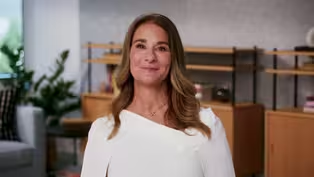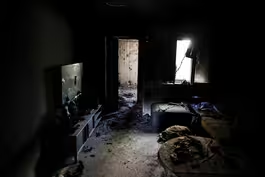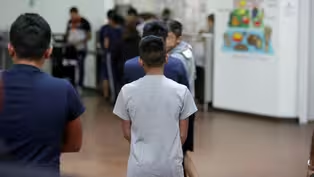
Admissions essays more important after affirmative action
Clip: 10/17/2023 | 7m 41sVideo has Closed Captions
College admissions essays more important for students after end of affirmative action
Students who are starting to apply to colleges for the coming year are the first class to deal with the impact of the Supreme Court's decision to overturn affirmative action. For many high school students, this annual rite of passage is now trickier than ever to navigate. Special correspondent Hari Sreenivasan takes a look for our higher education series, Rethinking College.
Problems playing video? | Closed Captioning Feedback
Problems playing video? | Closed Captioning Feedback
Major corporate funding for the PBS News Hour is provided by BDO, BNSF, Consumer Cellular, American Cruise Lines, and Raymond James. Funding for the PBS NewsHour Weekend is provided by...

Admissions essays more important after affirmative action
Clip: 10/17/2023 | 7m 41sVideo has Closed Captions
Students who are starting to apply to colleges for the coming year are the first class to deal with the impact of the Supreme Court's decision to overturn affirmative action. For many high school students, this annual rite of passage is now trickier than ever to navigate. Special correspondent Hari Sreenivasan takes a look for our higher education series, Rethinking College.
Problems playing video? | Closed Captioning Feedback
How to Watch PBS News Hour
PBS News Hour is available to stream on pbs.org and the free PBS App, available on iPhone, Apple TV, Android TV, Android smartphones, Amazon Fire TV, Amazon Fire Tablet, Roku, Samsung Smart TV, and Vizio.
Providing Support for PBS.org
Learn Moreabout PBS online sponsorshipGEOFF BENNETT: Students applying to colleges now are the first class to deal with the impact of the Supreme Court's decision to overturn affirmative action.
For many high school students, this annual rite of passage is now trickier than ever to navigate.
Special correspondent Hari Sreenivasan takes a look for our series Rethinking College.
STUDENT: I am quite nervous.
STUDENT: Kind of nerve-wracking.
STUDENT: Kind of just stressful, as always.
HARI SREENIVASAN: These feelings are not uncommon for kids applying to college, but now students have one more question around the most subjective part of their applications, the essay.
STUDENT: I feel like it's become almost a competition.
HARI SREENIVASAN: In its ruling this summer, the Supreme Court said colleges and universities taking race into account during admissions were violating the Equal Protections Clause.
Overnight, thousands of prospective college students wondered how race could or would factor into their applications.
LUKE LASKEY, Student: It really narrows down what you're able to write about, which I don't like.
HARI SREENIVASAN: But many students are still hoping to distinguish themselves through their essays.
In his opinion, Chief John Roberts wrote: "Universities can still consider an applicant's discussion of how race affected his or her life, be it through discrimination, inspiration, or otherwise."
When is the sort of stress level peak on college admissions processes?
RAFAEL FIGUEROA, Dean of College Guidance, Albuquerque Academy: November 1.
HARI SREENIVASAN: Rafael Figueroa is the dean of college guidance at Albuquerque Academy, a prep school in New Mexico.
Prior to this, Figueroa worked in admissions departments at several colleges.
Has this been confusing for students?
RAFAEL FIGUEROA: It has been confusing.
And, for some, it was a little intimidating.
We had students saying, we hear you're not going to be able to mention race at all.
We hear we're not going to be able to write about that.
We hear we're going to have to scrub everything.
Students can still be themselves.
Don't change your plans.
Don't change your strategy right now.
But the essay is the one place where the students do have a chance to have a discussion with the Supreme Court.
DEAN JACOBY, Albuquerque Academy: If you have a college that you want to see... HARI SREENIVASAN: College knowledge helps students have that discussion.
It's a program offered by the academy to help kids prepare their college applications, and it has a high rate of success getting kids into colleges.
This year, the class is focused on helping kids write about their backgrounds in a way that colleges can take into consideration.
DEAN JACOBY: That doesn't mean that students can't talk about it.
Right?
It means that there's certain limitations on what the admissions officers can use that information for in their decision-making process.
HARI SREENIVASAN: Student anxiety has been so high since the ruling that the academy now offers the class multiple times a week.
STUDENT: I'm constantly thinking about the college essay.
RAFAEL FIGUEROA: Students therefore need to be prepared to convey the way that their culture, their ethnicity, their background has impacted their lives, has changed the person who they are and the person who they will bring to the college campus with them.
JEFF HUANG, Founder, CollegesLike: It's not crystal clear how colleges will deal with the question of the Supreme Court decision.
HARI SREENIVASAN: Jeff Huang once led the admissions at Claremont McKenna College.
JEFF HUANG: Colleges are changing the supplemental questions that they are asking students to complete that include stories of your background.
Tell me something really interesting about yourself.
HARI SREENIVASAN: I spoke to three seniors at the Academy, Matthew White, Sydney Marks and Ani (ph) Field.
They're all from diverse backgrounds.
And I asked them about what the decision meant for them and how they're planning to present themselves to colleges.
SYDNEY MARKS, Student: Ultimately, what they're asking for is our identity and who we are.
HARI SREENIVASAN: They have listened to their counselors and know that the essay is the way to give the admissions committees a chance to know them.
MATTHEW WHITE, Student: I have kind of lived in two separate worlds, almost, because I'm an urban Native, so I don't live on the reservation.
So it made me really rethink like, what has it been like to live in these two worlds?
SYDNEY MARKS: The Supreme Court made a ruling.
And that doesn't change my identity.
It doesn't change what I'm interested in and what my -- like, what I have achieved.
And so I kept a lot of what I said about being a Latina, especially from New Mexico.
ANIKA FIELD, Student: In the beginning, I didn't have much of about my race in my essay.
My mother's side of the family is from Guyana.
I want to honor and appreciate my mom's side of the culture, but I don't look that way.
HARI SREENIVASAN: We met with Sydney's parents at the Albuquerque Museum, where her mom, Josie Lopez, works as the head curator.
The court's decision was personal.
As JOSIE LOPEZ, Mother of Sydney Marks: As someone who has the experience of being a person of color moving through these kinds of systems myself, I think I had a great sense of sadness, because one of the most important things that happened to me in my educational experience was getting to be around and know students from all over the world.
HARI SREENIVASAN: Sydney's father, Alan Marks, who taught at a public school in New Mexico, worries about the students who don't have his daughter's advantages.
ALAN MARKS, Father of Sydney Marks: I think she's a strong enough student that she will get into college somewhere.
I'm more concerned about the school that I worked at in a very poor area, which was some indigenous, but mostly Latino school, where virtually none of the parents ever had a college education.
JEFF HUANG: There's a resource gap here, where lower-income students who attend generally public schools have a counselor-to-student ratio that might be 250 to one, might be 500 to one.
In the case of my daughter, it was about 600 to one counselor.
HARI SREENIVASAN: Huang now runs a free Web site called CollegesLike.com to help lower-income students find resources and schools similar to the ones they're interested in.
His previous experience gives him invaluable insight into the inner workings of colleges.
Are there college admissions departments sitting down with their legal departments and saying, what is a question that I can ask which gives me a good idea of who this person is without it being illegal as deemed by the Supreme Court?
JEFF HUANG: I think almost every college admission office in America is having conversations with legal counsel about how to do this in a way that is both with respect to the law, but also with respect to the institution's interests.
RAFAEL FIGUEROA: You still need to be you.
You still give the stories that you want to convey to colleges about you.
HARI SREENIVASAN: Back at the college knowledge classes at Albuquerque Academy, kids are still getting pointers on the Common App and test-optional schools, along with warnings that using generative artificial intelligence to write your essays is anything but intelligent RAFAEL FIGUEROA: Even if you do A.I.
to help you plan or focus on a topic, they expect it in the end that you can honestly say that the essay is ultimately your own.
HARI SREENIVASAN: For these students, making their essays their own means acknowledging their heritage.
SYDNEY MARKS: I think that's what I'm trying to show, that I care about my community and I do it by preserving my culture.
MATTHEW WHITE: I talk about a word called hozho, which is a Navajo word meaning beauty and harmony.
And it's kind of like on my journey, I'm trying to find Hozho and that beauty and harmony and walking in that way.
ANIKA FIELD: Just because I look the way that I do, that does not define my experiences and what I have grown up with.
So don't judge a book by its cover.
HARI SREENIVASAN: Judging an application is just what college committees will have to do in the next few months.
How they factor in race, that's their test.
For the "PBS NewsHour," I'm Hari Sreenivasan in Albuquerque, New Mexico.
A Brief But Spectacular take on making birth safer
Video has Closed Captions
Clip: 10/17/2023 | 3m 47s | Melinda French Gates' Brief But Spectacular take on making birth safer for moms and babies (3m 47s)
Families of Americans kidnapped by Hamas describe anguish
Video has Closed Captions
Clip: 10/17/2023 | 6m 29s | Families of Americans kidnapped by Hamas describe anguish and what they want Biden to do (6m 29s)
Hundreds killed in strike on Gaza hospital as war worsens
Video has Closed Captions
Clip: 10/17/2023 | 13m 36s | Hundreds killed in strike on Gaza hospital as Israeli-Hamas war worsens (13m 36s)
A look at Jim Jordan's often controversial record
Video has Closed Captions
Clip: 10/17/2023 | 11m 11s | A look at Jim Jordan's often controversial record in Congress (11m 11s)
Settlement would stop U.S. from separating migrant families
Video has Closed Captions
Clip: 10/17/2023 | 6m 25s | Settlement would stop U.S. government from separating families at border (6m 25s)
Providing Support for PBS.org
Learn Moreabout PBS online sponsorship
- News and Public Affairs

FRONTLINE is investigative journalism that questions, explains and changes our world.

- News and Public Affairs

Amanpour and Company features conversations with leaders and decision makers.












Support for PBS provided by:
Major corporate funding for the PBS News Hour is provided by BDO, BNSF, Consumer Cellular, American Cruise Lines, and Raymond James. Funding for the PBS NewsHour Weekend is provided by...




